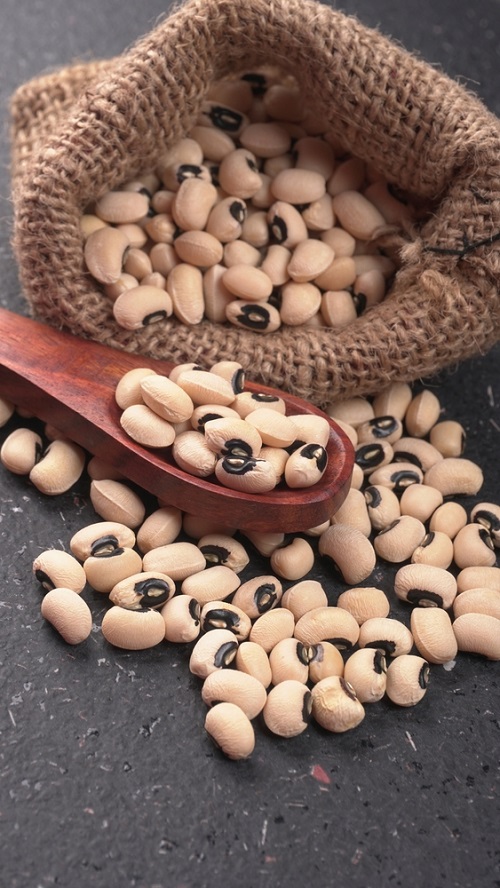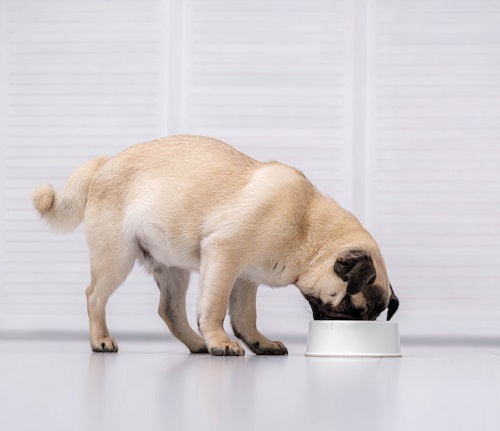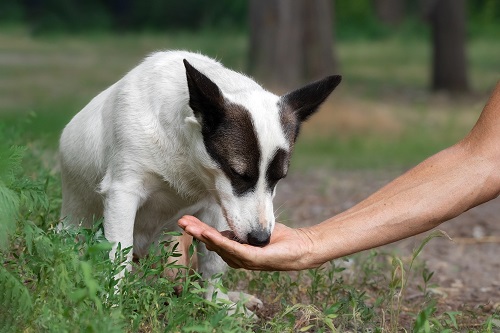Can Dogs Eat Black-Eyed Peas? Can it be a healthy snack option for your pooches? Let’s dive deep into it to get the answers!
Can Dogs Eat Black-Eyed Peas? Do they provide any essential nutrition to the man’s best friend? If you don’t have any idea, then keep on reading!
What are Black-Eyed Peas?

Black-eyed peas, also known as cowpeas, southern peas, or field peas, are a type of legume that is commonly eaten in various parts of the world. They are a staple food in many countries and are highly nutritious and rich in protein, fiber, and various vitamins and minerals.
Black-eyed peas have a distinctive creamy texture and a slightly nutty flavor and are commonly used in stews, soups, salads, and other dishes. They are also a popular ingredient in many vegetarian and vegan recipes due to their high protein content.
Check out Are squids Safe for Dogs? here
Can Dogs Eat Black-Eyed Peas?
So, Can Dogs Eat Black-Eyed Peas? Yes, dogs can eat black-eyed peas in moderation. Additionally, black-eyed peas should not be the main source of your dog’s diet as dogs require a balanced diet that includes other nutrients such as animal protein and fat.
Health Benefits of Black-Eyed Peas
Feeding your dog black-eyed peas can provide several health benefits, including:
- Protein: Black-eyed peas are a good source of protein, which is essential for your dog’s muscle growth and repair.
- Fiber: Black-eyed peas are also high in fiber, which can help regulate your dog’s digestive system and prevent constipation.
- Vitamins and minerals: They contain various vitamins and minerals, such as vitamin A, vitamin B6, potassium, and iron, which can help support your dog’s overall health and immune system.
- Weight management: Black-eyed peas are low in fat and calories, which can be beneficial for dogs that are overweight or prone to obesity.
- Antioxidants: Black-eyed peas contain antioxidants, which can help protect your dog’s cells from damage caused by free radicals.
- Grain-free option: If your dog has a grain allergy or sensitivity, black-eyed peas can be a great alternative to traditional grains in their diet.
Check out Are Millets Good For Dogs? here
A Few Health Concerns
While black-eyed peas can provide several health benefits for dogs when fed in moderation, there are also some risks to be aware of:
- Digestive issues: If your dog eats too many black-eyed peas or is not used to eating them, it may experience digestive issues such as gas, bloating, and diarrhea.
- Allergic reactions: Some dogs may be allergic to black-eyed peas or other legumes, so it’s important to monitor your dog for any signs of an allergic reaction, such as itching, swelling, or vomiting.
- Phytic acid: Black-eyed peas contain phytic acid, which can inhibit the absorption of certain nutrients in your dog’s diet. However, this is only a concern if black-eyed peas make up a significant portion of your dog’s diet.
- Sodium content: Canned black-eyed peas often contain added salt, which can be harmful to dogs in large amounts. If you are feeding your dog canned black-eyed peas, be sure to rinse them thoroughly to remove excess salt.
How To Feed Black-Eyed Peas On Your Dog?

If you decide to feed your dog black-eyed peas, here are some tips on how to do it safely:
- Cook the black-eyed peas thoroughly: It’s important to cook the black-eyed peas until they are soft and fully cooked. Undercooked beans can contain toxins that can be harmful to dogs.
- Avoid canned black-eyed peas: Canned black-eyed peas often contain added salt and preservatives, which can be harmful to dogs. Instead, use dried black-eyed peas and cook them yourself.
- Serve in moderation: Black-eyed peas should only be fed in moderation as a supplement to your dog’s regular diet. Too many beans can cause digestive issues such as gas, bloating, and diarrhea.
- Introduce gradually: If your dog has never eaten black-eyed peas before, introduce them slowly to avoid digestive upset. Start with a small amount and gradually increase the serving size over several days.
- Avoid seasoning: Do not add any seasonings or spices to the black-eyed peas when feeding them to your dog. Dogs do not need added salt or flavorings, and some seasonings can be toxic to dogs.
- Consult with your veterinarian: If you have any concerns about feeding your dog black-eyed peas or if your dog has any underlying health conditions, consult with your veterinarian before adding them to their diet.
Remember, black-eyed peas should not be the main source of your dog’s diet and should only be fed in moderation as a supplement to their regular food.
Check out Are Ramen Noodles Safe for Dogs? here
Can Puppies Eat Black-Eyed Peas
Puppies can eat black-eyed peas in moderation, but it’s important to introduce them slowly and in small amounts. Puppies have delicate digestive systems and may not be able to tolerate new foods as easily as adult dogs.
Are Black Peas Toxic To Dogs?
Yes, raw black-eyed peas are not safe for dogs as they contain a small amount of a toxic substance called saponin, which could cause stomach upset and digestive issues. However, cooked black-eyed peas in plain water are safe for dogs to eat. It’s important to avoid cooking them in canned chicken broth as it may contain too much salt and potentially harmful ingredients like onions and garlic, which are toxic to dogs.
Check out Are Prawns Bad For Dogs? here
Can Dogs Eat Canned Black-Eyed Peas
It’s not recommended to give canned black-eyed peas to dogs unless you rinse them off thoroughly first, as they typically contain too much salt, which can be harmful to dogs.
Can Dogs Eat Dried Black-Eyed Peas

Yes, dogs can eat dried black-eyed peas, but they should be soaked and cooked thoroughly before feeding them to your dog. Soaking the peas overnight helps to soften them and reduce their cooking time, making them easier to digest for your dog.
Check out Is Teriyaki Chicken Bad For Dogs? here
Quick Takeaways
So, Can Dogs Eat Black-Eyed Peas? The answer to this question is yes, as long as you do it in moderation and do not overdo it.
